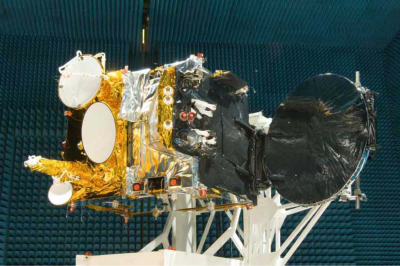Science Minister: State Should Fund New Satellite

The state is considering the possibility of funding a replacement for the Amos 6 satellite that was destroyed when the rocket that was to boost it into space exploded a week ago Thursday, on the eve of its liftoff into orbit. At a session of the Knesset Science and Technology Committee, Science Minister Ofir Akunis said that he had sent a letter to Prime Minister Binyamin Netanyahu and Finance Minister Moshe Kachlon asking for such assistance.
Amos 6 was to have been used by Israeli communications companies, including Bezeq and Yes, as well as a slew of foreign companies, including Facebook, which was planning to use the satellite to build a wireless data network throughout northern and central Africa. Akunis said that the loss of the satellite was a double blow – both for the investment and technology that was lost when the SpaceX rocket that was to lift it into space exploded and because it was to replace the Amos 3 satellite, currently the mainstay of civilian satellite communications for Israel. In November 2015, the Amos 5 satellite was “lost,” and all communications with it ceased.
The assistance, if it is granted, will be given to Israel Aerospace Industries, which built the satellite, and SpaceCom, which was to operate it. However, either company could probably handle the project alone – IAI internally, and SpaceCom by contracting with a foreign company to build the satellite. The main criterion, Akunis said, will be the speed with which the satellite can be built and deployed.
“The loss of the Amos 5 and 6 satellites has not harmed Israel’s capabilities in satellite development and technology, and we want to actualize these capabilities,” Akunis told the MKs. “There is an important strategic advantage in building a satellite in Israel. We need to ensure that we are completely independent in the area of space and communications, and building a new satellite quickly is the fastest way to accomplish that goal.”
According to Peretz Vazan, director general of the Science Ministry, Israel is generally dependent on several undersea cables for its international communications, and they are very vulnerable to both natural and manmade interference. “Satellites are the one alternative to ensuring independence in this area, providing us with communications as needed and providing maximum security,” he said.
To Read The Full Story
Are you already a subscriber?
Click "Sign In" to log in!

Become a Web Subscriber
Click “Subscribe” below to begin the process of becoming a new subscriber.

Become a Print + Web Subscriber
Click “Subscribe” below to begin the process of becoming a new subscriber.

Renew Print + Web Subscription
Click “Renew Subscription” below to begin the process of renewing your subscription.










